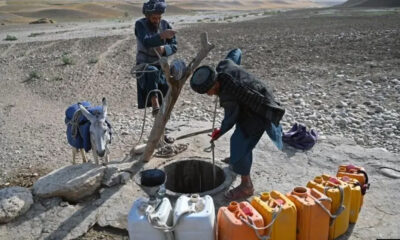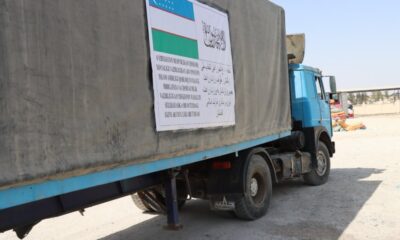Regional
Fire in Kuwait building kills 49 foreign workers
Three of 11 Filipino workers in the building were brought to hospitals, while the status of five remained unclear and three were safe, the Philippine migrant workers ministry said in a statement on Thursday.
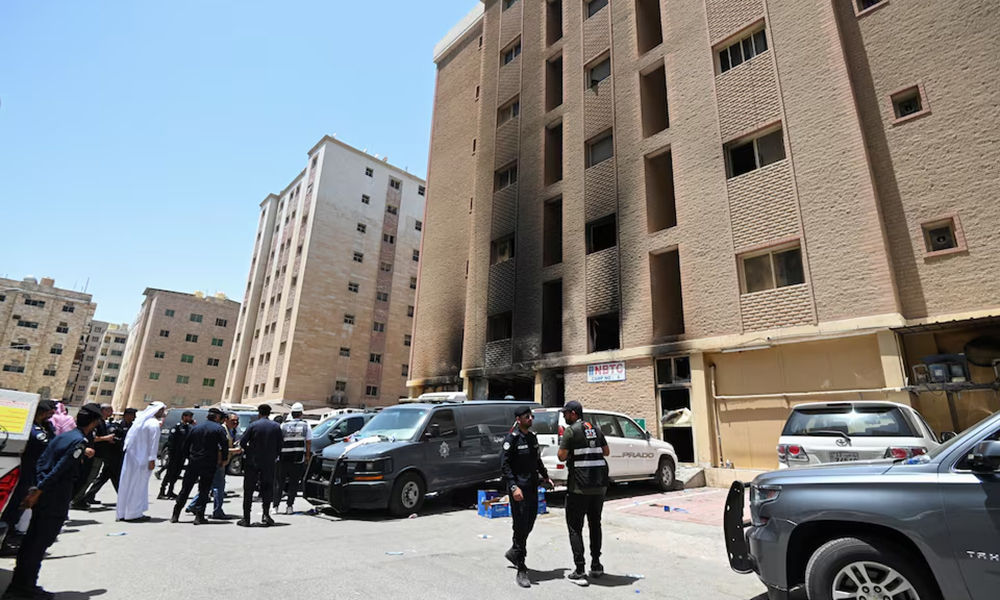
At least 49 people were killed in Kuwait on Wednesday after a fire broke out in a building housing foreign workers, with Kuwait’s deputy prime minister accusing property owners of committing violations that contribute towards such incidents.
The nationalities of those who died were not immediately disclosed by authorities. India’s ambassador visited hospitals where workers were being treated for injuries sustained in the fire, Reuters reported.
At one hospital, more than 30 Indian citizens were admitted, the embassy wrote on social media, adding that at least 47 workers had received treatment in hospitals.
Several Indians, including from the southern state of Kerala, were reported to have died in the fire, according to a letter written by Kerala chief minister Pinarayi Vijayan to India’s foreign minister that was shared with the press.
A government agency for Keralites living outside the state said it had been told by the Indian community in Kuwait that 41 Indians, including 11 from Kerala, had died in the fire.
Reuters could not independently verify the figures.
Visiting the site, Deputy Prime Minister Sheikh Fahad Yusuf Saud Al-Sabah said “the greed of real estate owners is what leads to these matters”. It was not immediately clear if any violations had taken place at the building or what they were.
Low paid, blue collar workers in the Gulf often live in overcrowded accommodation. Local authorities did not disclose what kind of employment the workers were engaged in, though like in other Gulf states, Kuwait relies heavily upon foreign labour in industries like construction, including from South and Southeast Asia.
An Egyptian who survived the fire and worked as a driver in Kuwait, told local media the fire had started on a lower floor and that those on higher levels were unable to escape. He said the building had filled with thick smoke.
Three of 11 Filipino workers in the building were brought to hospitals, while the status of five remained unclear and three were safe, the Philippine migrant workers ministry said in a statement on Thursday.
Emir Sheikh Meshal al-Ahmad al-Sabah ordered an immediate investigation into the cause of the fire and said that any officials found responsible would be held accountable, read the report.
The interior ministry, which said the death toll had risen to 49, was investigating, searching the site for victims and working to identify those who had died, state media reported.
The fire in Mangaf, a city along the coast south of the capital Kuwait City, was reported to local authorities at 6 a.m. (0300 GMT), Major General Eid Rashed Hamad told state television. It was later contained.
Another senior police commander told state television that many people had died from smoke inhalation, and dozens were rescued. He said the building housed a large number of workers.
The senior police commander said authorities had warned against housing too many workers in a single accommodation, but didn’t say if regulations had been flouted.
Indian Prime Minister Narendra Modi described news of the fire as saddening in a post on social media platform X.
“My thoughts are with all those who have lost their near and dear ones. I pray that the injured recover at the earliest,” he said.
Related Stories:
New York City apartment building fire kills 19, including 9 children
Regional
Indian air force says losses are part of combat but all pilots back home
A Pakistani military spokesperson told Reuters on Wednesday that five Indian aircraft had been shot down, but the claim was not confirmed by India.

The Indian Air Force said on Sunday that “losses are a part of combat” without giving details but added that all its pilots were back home after fighting with Pakistan this week, responding to a question on whether the force suffered losses.
A Pakistani military spokesperson told Reuters on Wednesday that five Indian aircraft had been shot down, but the claim was not confirmed by India.
Also on Wednesday, four government sources in Indian Kashmir told Reuters that three fighter jets crashed in the federal territory, hours after India said it struck nine Pakistani “terrorist infrastructure” sites across the border.
A ceasefire appeared to hold on Sunday between India and Pakistan, hours after the nuclear-armed rivals accused each other of violating a truce that brought them back from the brink of all-out war.
The ceasefire was agreed on Saturday after four days of missile, drone and artillery attacks which killed at least 60 people and sent thousands fleeing, in the worst violence since India and Pakistan’s last open conflict in 1999.
Regional
Putin proposes direct peace talks with Ukraine after three years of war
President Volodymyr Zelenskiy’s office and Ukraine’s foreign ministry did not immediately respond to Reuters’ request for comment on the proposal.

Russian President Vladimir Putin on Sunday proposed direct talks with Ukraine on May 15 in Turkey that he said should be aimed at bringing a durable peace, an initiative welcomed by U.S. President Donald Trump, Reuters reported.
Putin sent thousands of troops into Ukraine in February 2022, unleashing a war that has left hundreds of thousands of soldiers dead and triggering the gravest confrontation between Russia and the West since the 1962 Cuban Missile Crisis.
The Russian leader, who has offered few concessions towards ending the conflict so far, said the talks in the Turkish city of Istanbul will be aimed at eliminating the root causes of the war and restoring a “long-term, lasting peace” rather than simply a pause for rearmament.
“We are proposing that Kyiv resume direct negotiations without any preconditions,” Putin said from the Kremlin in the early hours of Sunday. “We offer the Kyiv authorities to resume negotiations already on Thursday, in Istanbul.”
Putin said that he would speak to Turkish President Tayyip Erdogan later on Sunday about facilitating the talks, which he said could lead to a ceasefire.
“Our proposal, as they say, is on the table. The decision is now up to the Ukrainian authorities and their curators, who are guided, it seems, by their personal political ambitions, and not by the interests of their peoples.”
President Volodymyr Zelenskiy’s office and Ukraine’s foreign ministry did not immediately respond to Reuters’ request for comment on the proposal.
In a message on the social network Truth Social, Trump hailed Putin’s proposal as a positive for ending the war.
“A potentially great day for Russia and Ukraine!” Trump said. “Think of the hundreds of thousands of lives that will be saved as this never ending ‘bloodbath’ hopefully comes to an end.”
Putin’s proposal for direct talks with Ukraine came hours after major European powers demanded on Saturday in Kyiv that Putin agree to an unconditional 30-day ceasefire or face “massive” new sanctions, read the report.
Putin dismissed what he said was the attempt by some European powers to lay down “ultimatums”.
Russia, Putin said, had proposed several ceasefires, including a moratorium on striking energy facilities, an Easter ceasefire and most recently the 72-hour truce during the celebrations marking 80 years since victory in World War Two.
Both Russia and Ukraine accused each other of violating the temporary truce proposals, including the May 8-10 ceasefire.
Despite Putin’s call for peace talks, Russia on Sunday launched a drone attack on Kyiv and other parts of Ukraine, injuring one person in the region surrounding the Ukrainian capital and damaging several private homes, Ukrainian officials said.
Putin said that he does not rule out that during his proposed talks in Turkey both sides will agree on “some new truces, a new ceasefire,” but one that would be the first step towards a “sustainable” peace.
Putin, whose forces have advanced over the past year, has stood firm in his conditions for ending the war despite public and private pressure from Trump and repeated warnings from European powers.
In June 2024, he said that Ukraine must officially drop its NATO ambitions and withdraw its troops from the entirety of the territory of four Ukrainian regions claimed by Russia, read the report.
Russian officials have also proposed that the U.S. recognise Russia’s control over about one-fifth of Ukraine and demanded that Ukraine remains neutral though Moscow has said it is not opposed to Kyiv’s ambitions to join the European Union.
Putin specifically mentioned the 2022 draft deal which Russia and Ukraine negotiated shortly after the Russian invasion started.
Under that draft, a copy of which Reuters has seen, Ukraine should agree to permanent neutrality in return for international security guarantees from the five permanent members of the U.N. Security Council: Britain, China, France, Russia and the United States.
“It was not Russia that broke off negotiations in 2022. It was Kyiv,” Putin said. “Russia is ready to negotiate without any preconditions.”
He thanked China, Brazil, African and Middle Eastern countries and the United States for their efforts to mediate.
Trump, who says he wants to be remembered as a peacemaker, has repeatedly said he wants to end the “bloodbath” of the Ukraine war which his administration casts as a proxy war between the United States and Russia.
“I will continue to work with both sides to make sure that it happens,” Trump said in his Truth Social post on Sunday. “The USA wants to focus, instead, on Rebuilding and Trade. A BIG week upcoming!”
Former U.S. President Joe Biden, Western European leaders and Ukraine cast the invasion as an imperial-style land grab and repeatedly vowed to defeat Russian forces.
Putin casts the war as a watershed moment in Moscow’s relations with the West, which he says humiliated Russia after the Soviet Union fell in 1991 by enlarging NATO and encroaching on what he considers Moscow’s sphere of influence, including Ukraine.
Regional
Explosions reported after India and Pakistan agree to ceasefire
News of the ceasefire was greeted with relief on both sides of the border and Pakistan’s airport authority said its airspace had been fully reopened.
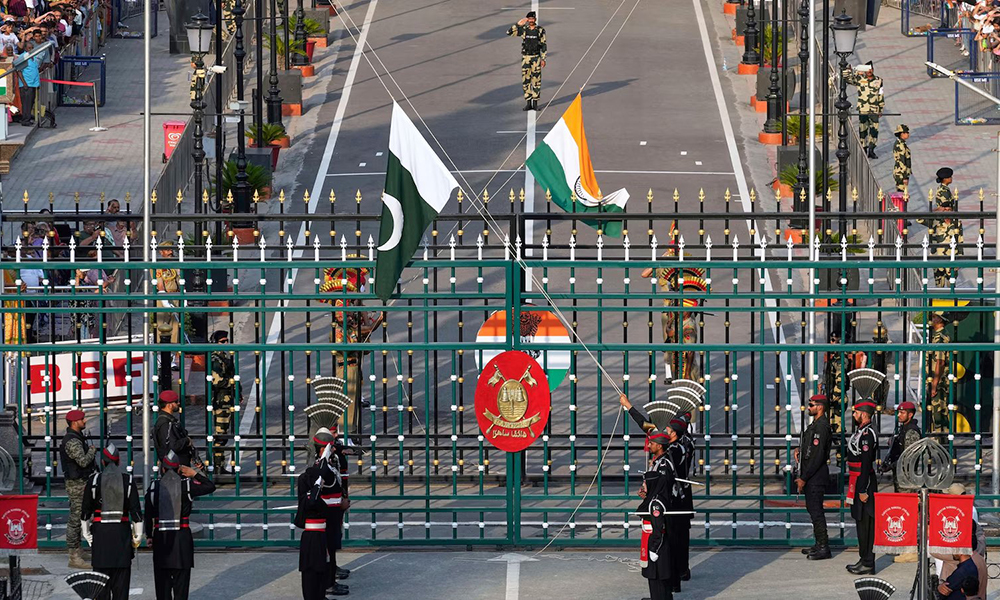
Nuclear-armed neighbours India and Pakistan agreed to a ceasefire on Saturday after U.S. pressure and four days of fighting, but within hours explosions rang out in border cities and towns and India accused Pakistan of violating the pact, Reuters reported.
Artillery fire and attack drones were witnessed in Jammu and Kashmir, the centre of much of the fighting, while blasts from air-defence systems boomed in cities under blackout, similar to the previous evening, according to authorities, residents and Reuters witnesses.
Indian Foreign Secretary Vikram Misri told reporters that Pakistan had violated the understanding arrived at by the two countries earlier in the day, and that the Indian armed forces had been instructed to “deal strongly” with any repetition.
“We call upon Pakistan to take appropriate steps to address these violations and deal with the situation with seriousness and responsibility,” Misri told a media briefing.
In response, the foreign ministry of Pakistan said the country was committed to the ceasefire and blamed India for the violations. “Our forces are handling the situation with responsibility and restraint,” it said.
The ministry also called on troops on the ground to exercise restraint and said that any issues in the implementation of the ceasefire should be addressed through communication at appropriate levels.
Pakistan’s military spokesperson did not immediately respond to requests for comment.
The fighting has been the worst between the old South Asian enemies in nearly three decades and threatened to erupt into a full-scale war in one of the world’s most volatile and densely populated regions.
There were briefly fears that nuclear arsenals might come into play as Pakistan’s military said a top body overseeing its nuclear weapons would meet.
But the defence minister said no such meeting was scheduled, hours after a night of heavy fighting in which the two countries targeted each other’s military bases and the combined civilian death toll rose to 66.
“Pakistan and India have agreed to a ceasefire with immediate effect,” Foreign Minister Ishaq Dar posted on X. “Pakistan has always strived for peace and security in the region, without compromising on its sovereignty and territorial integrity!”
Misri had earlier said the chiefs of the two countries’ military operations had spoken to each other and agreed that all fighting would stop at 5 p.m. Indian time (1130 GMT).
U.S. President Donald Trump posted: “After a long night of talks mediated by the United States, I am pleased to announce that India and Pakistan have agreed to a FULL AND IMMEDIATE CEASEFIRE. Congratulations to both Countries on using Common Sense and Great Intelligence.”
Dar told the broadcaster Geo News that military channels and hotlines between India and Pakistan had been activated, and three dozen countries had helped to facilitate the agreement.
On Wednesday, India had attacked what it said was “terrorist infrastructure” in Pakistani Kashmir and Pakistan, two weeks after 26 people were killed in an attack on Hindu tourists in Indian Kashmir, read the report.
Pakistan denied India’s accusations that it was involved in the attack. Days of cross-border fire, shelling and drone and missile attacks followed.
Despite the truce, two Indian government sources told Reuters that the punitive measures announced by India and reciprocated by Pakistan, such as trade suspension and visa cancellations, would remain in place for now.
The sources also said the 1960 Indus Waters Treaty, a critical water-sharing pact that India suspended after the Kashmir attack, would remain suspended.
The Indian foreign ministry did not respond to a request for comment.
U.S. Secretary of State Marco Rubio said that he and Vice President JD Vance had engaged with Indian Prime Minister Narendra Modi and Pakistan’s Shehbaz Sharif, Indian Foreign Minister Subrahmanyam Jaishankar, Pakistan’s army chief Asim Munir, and the two national security advisers over the course of 48 hours.
In a post on X, Rubio commended Modi and Sharif on the agreement, which he said included not only an immediate ceasefire but also the start of talks on “a broad set of issues at a neutral site.”
News of the ceasefire was greeted with relief on both sides of the border and Pakistan’s airport authority said its airspace had been fully reopened.
But the subsequent violations sparked alarm in India.
“What the hell just happened to the ceasefire? Explosions heard across Srinagar!!!”, Omar Abdullah, chief minister of Indian Kashmir, posted on X. “This is no ceasefire. The air defence units in the middle of Srinagar just opened up.”
India and Pakistan have been locked in a dispute over Kashmir ever since they were born at the end of British colonial rule in 1947. Hindu-majority India and Muslim Pakistan both rule part of Kashmir but claim it in full.
They have gone to war three times, including twice over Kashmir, alongside numerous smaller outbreaks of fighting.
India blames Pakistan for an insurgency in its part of Kashmir that began in 1989 and has killed tens of thousands. It also blames Pakistani Islamist militant groups for attacks elsewhere in India.
Pakistan rejects both charges. It says it provides only moral, political and diplomatic support to Kashmiri separatists, Reuters reported.
-

 Regional5 days ago
Regional5 days agoIndia dismisses report of Pakistan downing jets as “disinformation”
-

 Sport4 days ago
Sport4 days agoAriana Television to broadcast 4th edition of Afghanistan Futsal Premier League
-
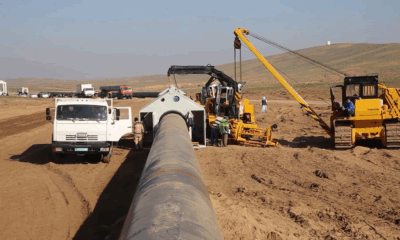
 Latest News4 days ago
Latest News4 days agoTAPI pipeline to reach Herat by end of 2025: Ministry
-

 Latest News4 days ago
Latest News4 days agoNearly one-third grapple with hunger in Afghanistan: WFP
-

 Sport4 days ago
Sport4 days agoIPL 2025: Dharamsala match abandoned due to security concerns
-

 Latest News4 days ago
Latest News4 days agoUzbekistan, Poland discuss cooperation over Afghanistan
-

 Regional3 days ago
Regional3 days agoIndia says military stations attacked by Pakistan drones and missiles
-

 Tahawol5 days ago
Tahawol5 days agoTahawol: Ministry of Labor and Social Affairs’ activities reviewed










